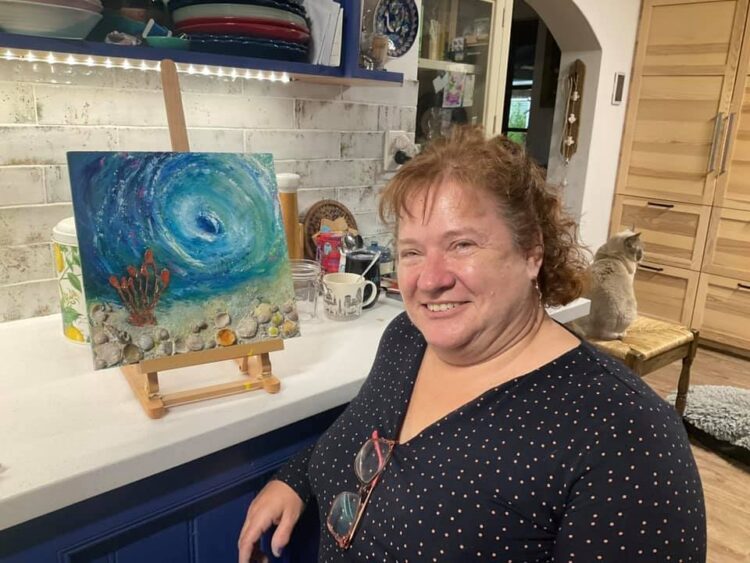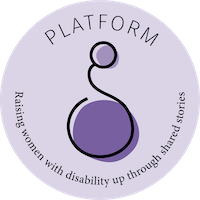What has been your journey of disability?
My journey with disability has been a long and varied one. I have Spina Bifida, and started my education at Sir Edgar and Lady Coles Kindergarten in Burwood East (now Blackburn South). At 4½ years old, I moved on to Mt Eliza Special School, which meant taking a long bus ride every day from Mulgrave to Nepean. It was a bit of a gruelling routine, longer than my dad’s workday of 7:30 am to 4 pm. Towards the end of my time there, a taxi would pick me up from home, collect a few other students, and we’d meet the bus at a petrol station to continue the hour-long journey. Then the reverse on the way home, dropping off kids before we got to my place.
I was the first person with a disability at my local primary school when I began mainstream education in Grade 3. I continued to be the first person with a disability when I went to Brentwood High School in Year 7 and Korowa CEGGS in Years 9–12. In grade 4, I sat next to the Brownie leader’s eldest daughter, who teased me and refused to share her spelling or math books with me—perhaps worried she’d ‘catch something’. So, I got good at reading upside down or sideways. Throughout primary school I spent most recess and lunchtimes walking around the playground or in the library, honing my bookworm skills. Sometimes I’d stand in for a ‘post’ as the girls played elastics and now and then they’d borrow my sticks pretending to have a broken leg. When the bell went, I’d have to wait to get my sticks back from wherever they’d been dropped as the girls ran to line up to go back into class. So I was often last in line. I tended to take the new kids under my wing, especially if they came from non-English speaking backgrounds – a hint to my later championing of ‘the others’.
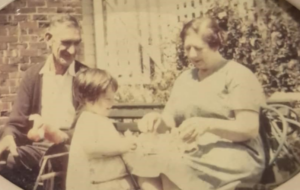
During my first year at Monash University, studying my Bachelor of Arts I got my driver’s license. I learnt to use hand controls through lessons at the Commonwealth Rehab Centre’s driving school. This was shortly after returning from the 1984 Summer Paralympics at Stoke Mandeville, UK where I won bronze in the 400 meters Freestyle, beating my personal best time by 11 seconds.
Originally, I wanted to become a librarian. However the High School Careers teacher suggested I’d be hidden away in a back room, covering books. So, instead I volunteered for 6 weeks’ at two of Monash University’s libraries in my second year.
Part way through my Honor’s year I needed surgery. It took far longer to recover from it than anticipated, so I deferred study. Once healed I felt I needed more life experience, so enrolled in social work. I then realised I had actually had my fill of studying and never began that course, choosing to do admin work in my family’s business while I figured things out. Through that experience, I learned a lot about professionalism—how to dress well, speak well, and look after yourself in the workplace. By the time I decided to resume my Honor’s year, I’d missed the deadline to do so and would’ve had to start Honor’s again. No thanks!!
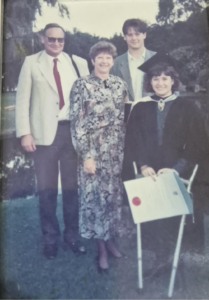
As a young person with a disability, did you get the opportunity to meet and mix with other young people with disabilities?
Yes, I did – specifically young people with Spina Bifida and Hydrocephalus and there were a couple older than me who acted as peer support/mentors, even though they didn’t know it.
As a teenager, throughout Year 7, 8, or 9, the families of young adults from the Spina Bifida Association of Victoria hosted regular record nights. We’d chat, have supper, and listen to music like ABBA, Plastic Bertrand, and the Bay City Rollers. It was a way to feel connected with others who understood what I was going through. During this time I was also excited to be approached by a writer who used the primary school experiences of myself and two of my friends’ to write a children’s book called ‘Boy on sticks’.
In Year 10, I attended SRDC, a sports and recreation program for children with disabilities at Glenallen Special School- the Mt Eliza Special School having relocated to Glen Waverley. It was great for socializing and being active with other kids who shared similar experiences, and we’d enjoy movie nights or discos at the school.
As a young adult I learnt to play wheelchair tennis and wheelchair basketball but always felt more at home in the pool. The team games were more about fun socialising with others.
If so, did the opportunities to do so make a difference to you and how you felt about your young self?
Absolutely, those experiences made a huge difference in how I viewed myself. If I hadn’t had access to special needs services, and others form the SB Association I wouldn’t have had so many various life-changing, albeit sometimes challenging, experiences. My confidence was pretty low as a teenager, but those opportunities, amongst others, helped me grow.
My dad was into self-help and business development, during my teens and although I didn’t always appreciate his advice at the time, he passed on tips that have stuck with me.
Moving moved from special school to primary school, I felt really lonely, and joined the local Brownie group to make friends. My parents were incredibly supportive throughout my life and continue to be so. Mum talked to the Brownie leader at the start of each new year. This ensured I had the right support for things like weekend camping trips. Similarly she met with my teachers up until about year 7. For a few years post special school, someone from the Education Department met with me once a year to conduct literacy and numeracy tests. I guess to check my development.
My first school camp was in Year 7 as by then I was independent with self-care. Back then, we didn’t have the National Disability Insurance Scheme (NDIS) or support workers, so if I had any disability related issues, my parents sorted it out. I was driven to and from the local primary school until Grade 6, when I started walking home with my little brother and the other neighbourhood kids. When I moved to Korowa in Year 9, instead of a bus and train, then walking up a big hill, mum again drove me to and from school each day. A big commitment.
What was one significant experience that changed your life?
One of the most significant experience that truly shaped my life occurred when I started swimming with the North Lodge Swimming Academy. My parents supported me by paying for lessons, and from the age of 14, I trained with the junior squad after school. This led to a major milestone in 1981 when I competed in the First Invitational Junior Games at Stoke Mandeville, UK. I was selected for these games after competing with the Victorian team at the first disabled Junior Nationals in Adelaide.
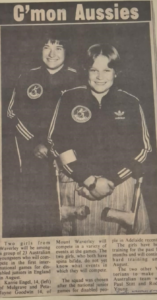
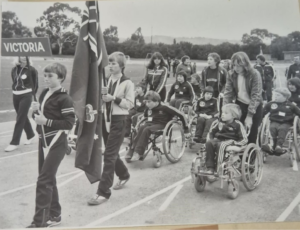
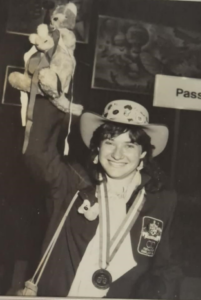
That experience opened many doors for me as I was classified according to the official classification and categories for World Para Athletics. (The Paralympic classifications determine who is eligible to compete and how they are grouped.) I was chosen to compete at the next Senior Nationals, an all-sports event held that same year at a LaTrobe University over a term break. The Halls of Residence transformed into the Games village where athletes from different disciplines came together. The two yearly National events were hosted by different states each time with accommodation a mix of hotels or migrant hostels. Via sport I was fortunate to travel to Perth, Sydney and Adelaide, and later Hong Kong, England and Beijing. Each providing many life-changing experiences.
By the time I was 25, I was swimming with AUSSI (Australian Union of Senior Swimmers International), having been granted special dispensation to compete, since the rules stipulated swimmers needed to be over 30 to participate.
My swimming experiences not only helped to build my physical endurance but also increased my confidence and provided a sense of belonging in a competitive space, which was invaluable for my personal development. It taught me resilience and perseverance, which have stayed with me throughout my journey, and many of the leadership skills I have today were fostered through mentors during my competitive years.
In addition to these athletic achievements, in 2002 I spoke at an international conference in Dar es Salaam, and later facilitated a workshop to empower adults in 2004 in Oslo at another conference. My husband and I also attended the 2014 Universal Design Conference then participated in the International Federation of Spina Bifida and Hydrocephalus’ conference in Stockholm. Engaging with global experts on inclusive design and accessibility, has furthered my passion for creating inclusive spaces and welcoming attitudes.
Upon graduating with my Masters in Human Rights from Curtin University, I became involved in the Human Library project in Perth. I’ve participated in events where I am “borrowed” as a book. This is part of a global initiative aimed to break down stereotypes in society. The ‘human book’ project offers people the chance to hear life stories firsthand from people they may never otherwise have contact with. Many fascinating and enlightening conversation has been started through being ‘read’ at events like PerthTED talks, Anti-Poverty week WA, not to mention in primary schools and in library settings.
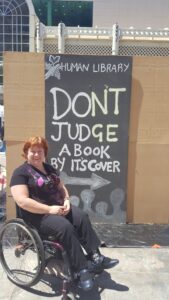
Throughout my life I’ve experienced many empowering moments that have shown me how sharing my experiences has the power to make a difference in others’ lives.
What do you do with yourself?
I’ve worked in a variety of roles. An initial 6-week contract doing admin for with the 40-hour famine ended up with me being employed for 12 years at World Vision Australia (WVA) in a range of client services and administration/research roles. I co-edited a book and helped train Asia-Pacific community staff who worked with children facing severe challenges—kids with disabilities, street kids, those affected by homelessness, and children who had been exploited or injured by landmines. I was also instrumental in setting up a coalition of non-government organisation (NGOs) representatives led by WVA which helped shape the Australian Disability Development Council (ADDC).
Over the years I have probably felt ‘imposter syndrome’ which I now put down to self-belief or the lack of, as I found myself in roles and positions that others saw me as capable of doing, but which I often became anxious about in advance, even though the roll out generally went smoothly.
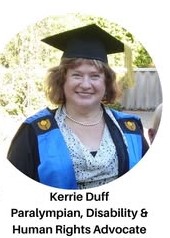
“Over the years I have probably felt ‘imposter syndrome’ which I now put down to self-belief or the lack of, as I found myself in roles and positions that others saw me as capable of doing, but which I often became anxious about in advance, even though the roll out generally went smoothly.”
Two specific moments from my WVA time that stand out were teaching a woman from Mongolia who worked with street kids in the sewers how to swim—on the roof of a hotel in Bangkok. Sadly, she later passed away from hepatitis, which she contracted while working in the field. I was at a conference to speak on the situation of disability in developing countries but felt my biggest impact was interacting with the community workers, not as the guest speaker. And another significant moment where I learnt a lot about myself was when I spoke to a group of Masai villagers via a translator when visiting Arusha with WVA after the Dar es Salaam IF conference ended.
My disability has had a huge impact on my career, fueling my advocacy work in the disability and human rights space to the point I set up my business Kerrie Duff Consulting. I’ve been involved with organizations like Women with Disabilities Australia and People with disabilities WA using my disability as motivation to work for greater inclusion and equality. This led me to set up my own disability awareness business, Kerrie Duff Consulting, after working for a time as a support coordinator.
Can you share some highlights from your time as a board member of The International Federation for Spina Bifida and Hydrocephalus (IF)?
In 2002 I was elected to serve on the IF Board, representing the Pacific Rim and focusing on increasing the involvement of adults living with sb/h in their local communities- traditionally associations being parent- or health professional-led.
At the same time I served as the vice president of the Australian Spina Bifida and Hydrocephalus Association (ASBHA). During this time I had limited contact with other local countries and fostered good relations with NZ. I was one of the inaugural board members of the Spina Bifida Foundation (SBF), through my role as President of the Spina Bifida Association of Victoria (SBAV) before it dissolved around 2004, as the last state-based SBH associations finally closed around Australia with the onset of the NDIS providing services for this cohort.
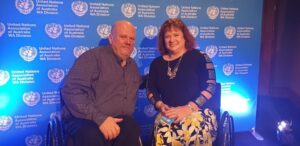
Being part of IF opened many opportunities for me to connect with advocates internationally and I have maintained strong connections with other individuals in the SB community since my time on the IF Board. I’m currently reestablishing links with NZ.
Two specific experiences that impacted were attending and presenting at IF’s first adult-led workshop in Tanzania and another in Oslo. More recently, I and a colleague, Christine, presented our findings from a survey we conducted across Australia on disability concerns and needs, to the attendees at IF’s 30th conference in the Kuala Lumpa. This was the first in-person IF conference since COVID. The connections and collaborations with people from all over the world remain and are incredibly rewarding.
What was your experience traveling for IF board meetings?
I travelled to Europe about every four months for board meetings whilst serving as the Pacific Rom representative. This involved flying to the northern hemisphere from Australia, with just one Board meeting held in Brisbane. The face-to-face meetings were held Thursday to Sunday, which meant I used my annual leave for travel over these years. I’d arrive on a Wednesday and catch the return flight home on Monday, which meant squeezing the entire trip into a short window before going back to work.
Traveling from Australia required significant planning, particularly around which airports offered good assistance for people with disabilities. I quickly learned which airports to avoid—Charles De Gaulle, for example, is one I’ll never go through again, if I can help it!
Having learnt to walk using a frame and calipers, by primary school I relied upon crutches and AFOs. Over the last 8 years I’ve used a wheelchair for mobility.
Travel has always brought new experiences. On flights I take a backpack and often a big handbag. Sometimes, a hostess would assist me with these. Nowadays I have a suitcase I can attach to the back of my wheelchair to pull it and the backpack along independently.
In recent years when travelling alone, or with others I always arrange for formal assistance. It is far easier to organise now days. It took me a while to learn to ask for a cart or wheelchair to transfer me from gate to gate, in transit, instead of wearing myself out getting to and from independently. Back in 1981 at the First Invitational Children’s Games, a cherry picker was employed to transfer all the team members on and off the plane in Heathrow. Also, over time, I’ve transitioned to using a wheelchair at airports, which enables me to generally board and disembark more smoothly, although we’re always first on and last off.
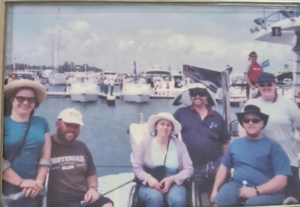
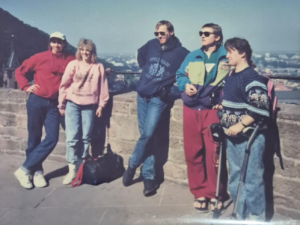
I’ve had the opportunity to visit some incredible places for board meetings and conferences, including France, Poland, Tanzania, Norway, Finland (where my mum and I visited St. Petersburg afterwards), and Germany. On one trip, I arrived early in the morning at a hotel in Frankfurt to do some World Vision Australia work after the Board meeting, only to find it closed, despite prior confirmation. I had to wait for hours until it opened during business hours, which was quite a nerve-wracking experience. Another time, I travelled solo on a train from Toulouse to Nice in France. Aside from this I was fortunate to do research for work when I visited rehabilitation centres in Phnom Penh and Ho Chi Minh City. I certainly learned a lot from navigating these solo adventures.
Such experiences are not purely about the meetings but also about my own personal growth and the chance to connect with a global community dedicated to advancing the rights and support of individuals with spina bifida and hydrocephalus, and disability in general.
What does travel look like for you now?
Travel is a bit different now, but I still enjoy it when I can. Last year, I travelled to Sydney to see the musical Hamilton with a support person for the first time. I took along my Smoov and sleep apnoea machine, along with the Phoenix suitcase. This made the experience both easier and more challenging. Certainly a learning opportunity—honestly, my support person learned more than I did!
Martin (my husband) and I spent our honeymoon on a cruise where the accessible room had a fold out couch and hospital bed. Since then we have travelled together around NZ and Fiji /Noumea on ships with a tad more accessible accommodation. These have been great experiences and we’re looking forward to a future trip sometime.
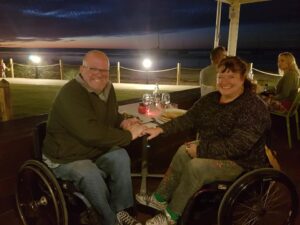
In 2023, I attended Fibres West, a week-long residential textile art retreat, which was another memorable trip. I had a support worker who drove me to Muresk. She helped with carrying things, like meals in a crowded dining room and assisting me with getting up hills and steps. I’ve also done weekend retreats with friends, where they helped me with my suitcase and sewing machine.
However, as we’ve all got older, it’s become less practical for me to rely on friends for assistance with carrying items and navigating steps. A quilt retreat at New Norcia was a particular challenge. I had to sit on a step and lift myself up into the building, then have my wheelchair lifted into the kitchen or sewing room, then get back into the chair. While there was a ramp to the sewing room, it was at such an angle that it was difficult to use even with someone behind me. In another room a door had to remain open for me to get someone’s attention inside so they could hold the door open, for me to push up the ramp, and enter the workshop. No subtle comings and goings there!
Travel and retreats these days can be tricky, but I still try to make it work when I can. I also run workshops for empowering others in the community and educating people with disabilities and their carers about the NDIS, so I keep busy even if travel is a bit more complex.
Is there something that you would like people to know about you or about people with disabilities that they might not know?
I would say, “Assume nothing.” It’s easy for people to make assumptions based on what they think they know about disability, but it’s important to challenge those assumptions. One of the moments that really opened my eyes happened before I got my license. I was driven home from training one evening by a teammate who was a quadriplegic and realized something that had never fully clicked for me before. We’d been driving on the freeway, and it suddenly hit me: he wasn’t using his legs to drive. It was such an epiphany—this assumption I had never thought to challenge. Anything truly is possible. The old ‘if you can’t see it, you can’t be it.’
“I would say, “Assume nothing.” It’s easy for people to make assumptions based on what they think they know about disability, but it’s important to challenge those assumptions.”
Another experience that taught me a lot was when I was staying with friends for the weekend in Hamilton. My friend in the passenger seat said, “Put your hand down,” and I had no idea what she meant. She wanted me to speed up to pass a truck on a long stretch of flat country road. If she’d said, “Put your foot down,” I would have understood right away. But she converted the language to something she thought I would understand. It’s interesting how conditioned we are to think in terms of what’s normal. She’d also call “flick, flick” when I needed to switch the high beam on and off on the long dark stretches—this holiday being while I was still on P plates, unused to country driving at night. It’s a small thing, but it really showed me how the world is often framed in ways that don’t always take disability into account.
Best advice that you would like to share with other women with disabilities?
Get involved with organizations like WWDA (Women with Disabilities Australia) or check if your local state has a women’s advocacy group. These groups offer a strong support network and provide a platform for you to be heard and to develop skills. I’ve learned so much through my involvement in stakeholder groups and steering committees, including how to convert complex English into Plain English and then into Easy English. Skills that help me in many aspects of my daily work.
You can’t second guess the future. When I undertook my Master’s internship with WA’s Individualised Services, I worked on developing a series of questions to guide people when looking for providers in the then-new NDIS system. While the project didn’t go anywhere right away, a few years later, those questions were developed as part of a wider series into a box of illustrated cards that can be used by anyone. Along with other cards on positive behaviour this resource now assists many others.
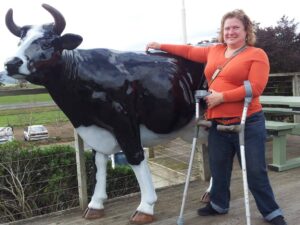
Another important piece of advice is to trust yourself and your body. You know it better than anyone else. Don’t let medical professionals intimidate you—speak up for yourself. If you’re nervous, bring someone with you to appointments so they can help you remember things, or ask questions you might forget. It’s perfectly okay to take notes during medical visits to keep track of what’s being said. I learned this the hard way when I met with a doctor in Ho Chi Minh City. I didn’t take notes because I thought it might seem disrespectful so was embarrassed to do so, but when I got back to Australia, I couldn’t remember all the details. So, take those notes. Don’t be afraid to ask questions. Always make sure you feel empowered in your healthcare journey. And consider mistakes as opportunities to do differently next time. Don’t sweat the small stuff.
“Consider mistakes as opportunities to do differently next time.
Don’t sweat the small stuff.”
For what would you most like to be remembered for?
I’d like to be remembered for my creativity and being community minded. I’ve always been involved in giving back, whether it’s through committees like PWDWA or the Embroiderers Guild, tutoring a Year 11 student struggling with English, or participating in mixed media craft groups. As a Human Book, I’ve shared my experiences on topics like advocacy, travel, self-esteem, and using assistive technology, aiming to demystify disability and “otherness.”
I want people to remember that it’s okay to ask for help. No one is an island, and how you ask is what matters.
My motto has always been “Strive to seek to find and not to yield” from Tennyson’s Ulysses. I believe in the journey and the process—nothing ventured is nothing gained. It’s taken me time to learn not to sweat the small stuff, but I’ve found peace in continuing forward, just like my nana taught me when I fell over in a big shopping centre as a child. As strangers gathered around, grabbing my sticks, it prevented me from steadying myself properly as I needed to, to get up safely: Her “Leave Kerrie to get up herself,” said in a firm but polite tone speaks volumes.
Over time, I’ve learned to figure things out on my own, and I now solve problems or seek assistance when needed. Ultimately, it truly does take a village.
Do you have a way for people to connect or follow you ?
Kerrie Duff Consulting
Insta kldnmjd Kerrie Duff Ply
www.linkedin.com/in/kerrie-duff-ply-20964527
https://www.facebook.com/KerrieDuffConsulting

